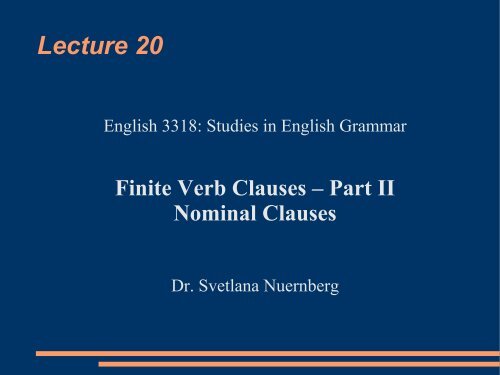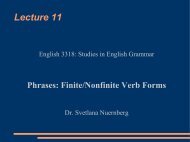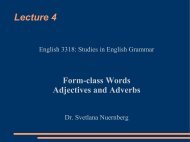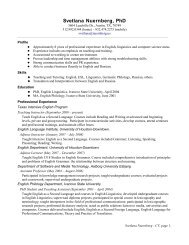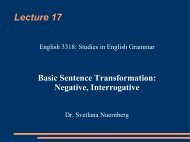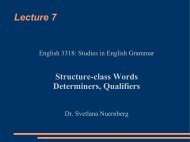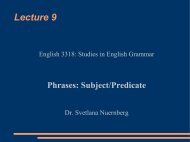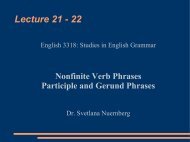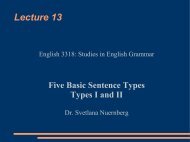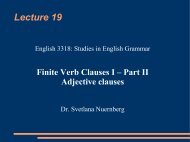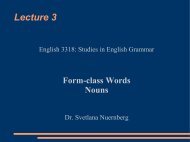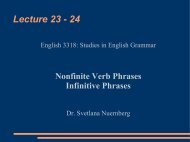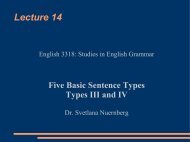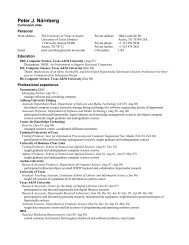Finite Verb Clauses
Finite Verb Clauses
Finite Verb Clauses
Create successful ePaper yourself
Turn your PDF publications into a flip-book with our unique Google optimized e-Paper software.
Lecture 20<br />
English 3318: Studies in English Grammar<br />
<strong>Finite</strong> <strong>Verb</strong> <strong>Clauses</strong> – Part II<br />
Nominal <strong>Clauses</strong><br />
Dr. Svetlana Nuernberg
Objectives<br />
● Recognize that-clauses and identify their functions<br />
● Distinguish between that as a demonstrative<br />
pronoun, a relative pronoun, and a complementizer<br />
● Recognize whether a dependent clause is<br />
functioning as a nominal, an adjectival, or an<br />
adverbial clause<br />
● Distinguish appositive noun phrases and clauses<br />
● Identify interrogative clauses
That-<strong>Clauses</strong><br />
● Nominal clause introduced by complementizer that<br />
– a word that creates a dependent clause that can substitute<br />
for a noun phrase sentence constituent<br />
– plays no role within the clause<br />
– does not contribute any information<br />
– the resulting that-clause functions as a a complement<br />
● constituent that helps to complete the sentence<br />
– after removing complementizer<br />
● the sentence can stand alone as an independent clause<br />
● Occupy a position normally filled by a noun<br />
– That it will rain tomorrow seems absolutely certain.<br />
● subject (it/something – substitute for the clause)<br />
– People forget that even grammarians get the blues.<br />
● direct object (it/something – substitute for the clause)<br />
– The good news is that Joey won the pie-eating contest.<br />
● subject complement (it/something – substitute for the clause)
Direct/Indirect Discourse<br />
● Direct quotations or direct discourse<br />
– uses the exact words of the quotation<br />
– is surrounded by quotations marks<br />
– has pronouns appropriate to the speaker and verb<br />
appropriate to the situation<br />
● The teacher announced, “Everyone earned an A on the midterm<br />
exam”<br />
● The teacher announced that everyone earned an A on the midterm<br />
exam.<br />
● When direct discourse is converted into indirect<br />
discourse<br />
– pronouns and tenses frequently have to be changed<br />
● Catherine said, “I do not want to intrude.”<br />
● Catherine said that she does not want to intrude.<br />
● The operator said, “The phones were working yesterday.”<br />
● The operator said that the phones had been working yesterday.”
Exercise 1<br />
● In each sentence below, create a that clause as a substitute<br />
for the italicized pronoun. Then identify the role of the<br />
clause in the larger sentence.<br />
Example: Marie prefers something. (direct object)<br />
Marie prefers that you not drum your fingers on the table.<br />
1. Walter said something.<br />
2. Something seemed suspicious to me.<br />
3. The truth is something.<br />
4. Before waiting another half hour on this corner, I think<br />
something.<br />
5. Judith thought something when her cell phone began to<br />
ring during dinner.<br />
6. Because of the storm, everyone believed something.
Contrast between Direct and<br />
Indirect Discourse<br />
Direct Discourse<br />
How Used Gives exact words spoken by someone.<br />
Markers Word order and verb tenses are the same as they<br />
would have been when the words are originally said.<br />
Punctuation Quotation marks surround and appropriate end<br />
punctuation follows words spoken by someone. First<br />
word capitalized.<br />
Examples Marie said, “We won't have time to see the second show.”<br />
He asked, “How long has it been since this piano was tuned?”<br />
Indirect Discourse<br />
How Used Reports the essence of what someone said.<br />
Markers Word order and verb tenses often differ from what they would<br />
have been when the words were originally said. Introduced<br />
by an interrogative word (who, what, why, etc.) or an optional<br />
that.<br />
Punctuation No punctuation used to set off from the rest of the sentence.<br />
Examples Marie said [that] we would not have time to see the second<br />
show.<br />
He asked how long it has been since our piano was tuned.
Differences between Relative<br />
<strong>Clauses</strong> and Nominal-<strong>Clauses</strong><br />
● Nominal That-Clause<br />
– You know that I don't want to read that book.<br />
● You know something/it.<br />
– pronoun can substitute for the clause<br />
● that I don't want to read that book<br />
– deleting that leaves a complete clause<br />
– if follows the noun nominal clause doesn't modify its noun<br />
● Adjectival Relative Clause<br />
– The oranges that we bought today are sour<br />
● *The oranges something are sower.<br />
– pronoun can't substitute for the clause<br />
● *that We bought today<br />
– deleting that leaves an incomplete clause (or sometimes changes the<br />
meaning)<br />
– follows the noun that it modifies<br />
– if completely removed, the entire sentence remain
Summary That-<strong>Clauses</strong><br />
Form 1. A dependent clause introduced by<br />
complementizer (expletive) that.<br />
2. That plays no role in the clause it introduces.<br />
Clause function Fills a noun phrase position in the sentence<br />
(subject, object, complement)<br />
Punctuation No punctuation<br />
Test<br />
1. If that is removed, a complete clause remains<br />
2. It or something can substitute for the entire clause
Appositive That-<strong>Clauses</strong><br />
● An appositive is a noun phrase that renames another<br />
noun phrase, one that it usually follows immediately<br />
– can replace the noun phrase it renames<br />
– can be deleted (if a noun phrase or a nominal clause)<br />
– Grocery shoppers doubted the Inquirer story that<br />
outerspace aliens had kidnapped Elvis.<br />
– the appositive is a nominal clause<br />
● Grocery shoppers doubted the Inquirer story<br />
● Grocery shoppers doubted that outerspace aliens had kidnapped<br />
Elvis.<br />
– Grocery shoppers doubted the Inquirer story, an outrageous<br />
report about Elvis.<br />
– the appositive is a noun phrase, but not a clause<br />
● Grocery shoppers doubted the Inquirer story<br />
● Grocery shoppers doubted an outrageous story about Elvis.
Relative <strong>Clauses</strong> and Deletion<br />
Transformations: Appositives<br />
● Deleting a relative pronoun<br />
– is an example of a stylistic transformation<br />
– it allows us to eliminate repetitions or to shift emphasis<br />
without affecting basic meaning of a sentence.<br />
● That man whom my son works for.<br />
● That man my son works for.<br />
● For stylistic purposes we can delete<br />
– a verb form of be followed by a nominal subject compliment<br />
(Type IV (NP 1 + MV link + NP 1 ) together with subject relative pronoun<br />
● Mr Hillgard, who was my biology teacher, secretly studies Egyptian<br />
mortuary science. (subject compliment)<br />
– Mr. Hillgard, who was my biology teacher, secretly studies Egyptian<br />
mortuary science. (an appositive)<br />
– Mr Hillgard, my biology teacher, secretly studies Egyptian mortuary science.<br />
(appositive – replaces the noun phrase it follows)
Diagrams<br />
In Reed-Kellogg diagram, an appositive is placed directly after the noun phrase<br />
that it renames, with the headword of the appositive noun phrase in parenthesis.<br />
Mr. Hillgard (teacher) studies science<br />
my biology secretly Egyptian mortuary<br />
A phase marker (tree diagram) can show entire structure from which the appositive<br />
is derived, where you can see the whole relative clause who was my biology<br />
teacher, with an indication of which constituents will be deleted.<br />
NP 1<br />
NP 1<br />
NP 1<br />
ADJP<br />
S IV<br />
VP 1<br />
S V<br />
MVP NP 1<br />
MV link<br />
MVP<br />
VP<br />
NP 2<br />
ADVP<br />
Mr. Hillard [Mr. Hillard was my biology teacher] studies Egyptian mortuary science secretly<br />
who was
Phrase Marker – Tree Diagram<br />
A phrase marker can also show the structure of the sentence with only the<br />
appositive noun phrase remaining from the original relative clause.<br />
NP 1<br />
S V<br />
NP NP<br />
MVP NP ADVP<br />
2<br />
Mr. Hillgard my biology teacher studies Egyptian mortuary science secretly<br />
MV tr<br />
● Appositives might be thought of as being adjectival<br />
are derived from relative clauses (which are adjectival in function)<br />
do not add information about the noun phrase they rename<br />
● Appositives are considered nominal in function<br />
rename another noun phrase<br />
can substitute for the noun phrase they rename<br />
VP
Restrictive and Nonrestrictive<br />
Appositives<br />
● Like the relative clauses from which they are derived,<br />
appositives can be<br />
– restrictive (does not require punctuation)<br />
● provide information that is essential for identifying who or what<br />
is being renamed<br />
● often consist of proper names<br />
– Eric's cousin Gwendolyn has the voice of an eight-year-old.<br />
– nonrestrictive (is surrounded by commas)<br />
● can sometimes be moved out of their basic positions<br />
– immediately after the noun they name<br />
● might be placed at the beginning of a sentence<br />
– An amazingly large child, Goliath _______ quickly<br />
dominated the youth soccer league
Functions of Nominal That-<strong>Clauses</strong><br />
Subject<br />
Direct Object<br />
Subject complement<br />
Adjective complement<br />
Appositive<br />
That his license was revoked shocked me.<br />
I hear that the dance was a great success.<br />
Her belief is that most reported UFO sightings<br />
are genuine.<br />
I am astonished that no one felt the tremor<br />
yesterday.<br />
Jennifer disputed the argument that gravity waves<br />
are undetectable.
Exercise 2<br />
● Analyze the dependent clauses with that in each of the following sentences.<br />
Decide whether it is a nominal clause or an adjectival relative clause. If it is a<br />
relative clause, identify the noun phrase that the clause modifies. If it is a<br />
nominal clause, identify what nominal function the embedded clause plays in the<br />
sentence.<br />
1. The “voice-over the Internet protocol” (VOIP) that allows people to make free<br />
telephone calls is attracting more and more people.<br />
2. VOIP means that people who have broadband connections can choose from<br />
number of telephone providers.<br />
3. An attractive feature of computer telephony is that you can take your computer<br />
phone whenever you go in the world.<br />
4. In addition, your computer telephone number can be the same as the one that is in<br />
your home.<br />
5. That a call from anywhere in the world will be charged as a local call is attractive<br />
to business travelers<br />
6. A fear that Internet telephone service will drive traditional telephone companies<br />
out of business is widespread.<br />
7. Some telephone companies want to block the new technology temporarily in<br />
hopes that it will fail.<br />
8. Others expect that they will be able to use the new technology in a way that will<br />
expand their own telephone service.
Nominal That-<strong>Clauses</strong> Direct Object<br />
Nominal that-clauses occur in the function and positions of noun phrases<br />
NP 1<br />
S V<br />
VP<br />
MVP NP 2<br />
MV tr<br />
COMP<br />
NP 1<br />
S V<br />
VP<br />
MVP NP 2<br />
MV tr<br />
Francine declared [that she detested pink shirts]<br />
Francine declared<br />
that<br />
she detested shirts<br />
pink
Nominal That-<strong>Clauses</strong> - Appositive<br />
NP 1<br />
S V<br />
VP<br />
MVP NP 2<br />
MV tr<br />
NP 2<br />
NP 1<br />
ADJP<br />
S IV<br />
VP<br />
MVP NP 1<br />
MV link<br />
parents retained<br />
COMP S V<br />
NP 1<br />
VP<br />
MVP NP 2<br />
Maggie's parents retained their dream [Their dream was that she would marry an ecologist]<br />
Maggie's parents retained their dream [which was that she would marry an ecologist]<br />
Maggie's parents retained their dream [that she would marry an ecologist]<br />
that<br />
she would marry ecologist<br />
dream ( )<br />
Maggie's their<br />
MV tr<br />
an
Nominal That-<strong>Clauses</strong> – Adjective<br />
Complement<br />
NP 1<br />
S III<br />
MVP<br />
MV link<br />
VP<br />
ADJ<br />
Florence seemed<br />
COMP<br />
ADJP<br />
NP<br />
NP 1<br />
S V<br />
VP<br />
MVP NP 2<br />
MV tr<br />
afraid<br />
Florence seemed afraid [that we had insulted the major]<br />
that<br />
we had insulted mayor<br />
the
Exercise 3<br />
● Analyze the following sentence by means of both phrases<br />
markers and Reed-Kellogg diagrams. Be alert to the<br />
subordinate (adverbial) and relative (adjectival) clauses that<br />
are included here along with with nominal that clauses.<br />
1. A woman on the motorcycle reported that she had collided<br />
with a 250-pound bear.<br />
2. An ambulance transported the woman to a hospital that<br />
treated her for a broken collarbone.<br />
3. The California Highway Patrol officers said that the woman<br />
was going 50-65 mph when she hit the bear.<br />
4. Officers believe that the shadows that occur in the late<br />
afternoon probably obscured the bear.<br />
5. The report that the bear had fled the scene surprised no one.
Interrogative <strong>Clauses</strong><br />
● Usually involve a question, directed either to oneself<br />
or to another, about the unknown<br />
– He asked which car has a better service record.<br />
– I wonder who left that message on my machine.<br />
– The movers asked where they should put the piano.<br />
● Begin with interrogative words who, which, what,<br />
why, when, where, how<br />
– interrogative words play grammatical role in the sentence<br />
● as determiners (which car)<br />
● as pronouns (who left that message)<br />
● as adverbs (where they should put the piano)<br />
● Function nominally, as noun phrase substitutes<br />
● Some do not pose a question<br />
– Margaret brought what we needed from a grocery store.
Summary Interrogative <strong>Clauses</strong><br />
Form 1. A dependent clause introduced by an interrogative word:<br />
what, who, whose, whom, which, where, when, why, how.<br />
2. The interrogative word plays a role in the dependent<br />
clause it introduces<br />
Clause function Can fill noun phrase positions in the sentence (subject,<br />
object, complement, object of a preposition)<br />
Punctuation No punctuation required<br />
Test 1. The sentence containing the clause can be transformed<br />
into a wh-question by substituting what for the dependent<br />
clause.<br />
2. It or something can substitute for the entire clause.
Functions of Interrogative <strong>Clauses</strong><br />
Subject of sentence<br />
Direct object<br />
Subject complement<br />
Object complement<br />
Object of a preposition<br />
Indirect discourse<br />
(direct object)<br />
What students need is more parking spaces.<br />
Did you find what you wanted at the store?<br />
That is exactly why we wanted to leave.<br />
They found the film just what they expected.<br />
He is afraid of where she will go.<br />
They asked when dinner would be served.
Diagramming Interrogative <strong>Clauses</strong><br />
NP 1<br />
NP 1<br />
S V<br />
MVP<br />
MV tr<br />
NP 2<br />
VP<br />
ADVP<br />
S V<br />
[the students said something about Professor Dozoff] didn't bother him<br />
(what)<br />
What the students said about Professor Dozoff didn't bother him<br />
VP<br />
MVP NP 2<br />
MV tr
Diagramming Interrogative <strong>Clauses</strong><br />
NP 1<br />
NP 1<br />
S V<br />
NP 2<br />
MVP<br />
MV tr<br />
VP<br />
S V<br />
ADVP<br />
VP<br />
MVP NP 3<br />
MV tr<br />
What the students said about Professor Dozoff didn't bother him<br />
students said What<br />
the about<br />
Professor Dozoff<br />
didn't bother him
Exercise 4<br />
● Analyze the following sentences using phrase<br />
markers and Reed-Kellogg diagrams. Be alert for<br />
several types of dependent clauses. Identify the<br />
kind of clause and its function in the sentence.<br />
1. Sylvia asked where the tour guide was taking us<br />
next.<br />
2. Henry wondered whose bags were still on the bus.<br />
3. We had an argument about which group was<br />
going to the grotto.<br />
4. How we would see the ruins in under an hour<br />
didn't worry Maggie.


